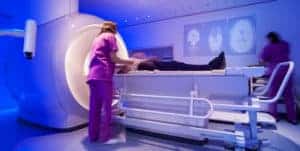
What Is an MRI?
An MRI uses magnetic fields and radio waves to create images of the internal body, allowing a clear picture of any abnormal tissues to render. MRIs are particularly useful for looking at ligaments, tendons, the spinal cord, and any other soft tissue in the body, while other scans like CT scans may be preferable for looking at bones.
Getting an MRI involves simply lying on a table, where you are placed in a large mechanical tube. You will be given some way to communicate with a technician, who can instruct you to lie still while pictures are being taken. For those who become claustrophobic, there may be options like “open” MRIs to help ease the anxiety. The only preparation typically necessary is the removal or disclosure of any metal in the body, such as piercings or any medical devices. Because of the use of magnets, these objects can be impacted and you will need to discuss the risk with your doctor.
When You Have Predominantly Leg Pain
If a patient’s pain is mostly showing up in the legs, particularly if it is radiating or shooting from the buttocks down, this may be an indication that a lumbar disc herniation has occurred. If this is suspected, an MRI can be a good way to locate the root of the pain and determine if surgery is needed. These surgeries generally allow patients to return to normal function quickly, and MRIs allow better planning for surgery.
When You Have Lower Back Pain
Unlike in a lumbar disc herniation, lower back pain can require much more invasive surgery to fix. Most doctors prefer to wait 3 to 6 months and use other methods of treating the injury to avoid these procedures. An MRI can help indicate where the pain has started and guide doctors and chiropractors in less invasive ways to treat the pain. While some people prefer to wait to do an MRI until surgery is imminent, the information provided by the diagnostic imaging may help prevent surgery from becoming necessary.
When You’ve Been in a Car Accident
Even if you aren’t showing symptoms of any injuries, an MRI can be an important form of diagnostic imaging in the wake of a car accident. These scans are able to indicate common issues like whiplash or a concussion that may not appear for days after the initial incident. In order to address these conditions early, an MRI scan can be a great proactive measure to take. Getting scans done may also be good evidence to present as part of an insurance claim if you need to prove any injuries have occurred.
You Are Having Unexplained Symptoms
In some cases where symptoms alone do not lead to a diagnosis, an MRI can be a tool to help doctors understand possible causes. MRIs can point to not only tumors, but damage to the heart and lungs, eye and ear issues, vein and artery problems, or brain abnormalities. They may also show pelvic problems, digestive tract issues, and diseases of the bones. In some cases, these MRIs may be performed over the course of treatment to track progress and eliminate any underlying conditions.
If you may need an MRI, it is important to find a diagnostic imaging center that you trust with your results. At AICA Orthopedics, we not only offer a state of the art imaging center, but a range of specialists who can use the results to determine the cause of your pain and determine a treatment plan. Chiropractors, physical therapists, and orthopedic doctors will work together to understand your results and create comprehensive treatment plans that return you to health.
